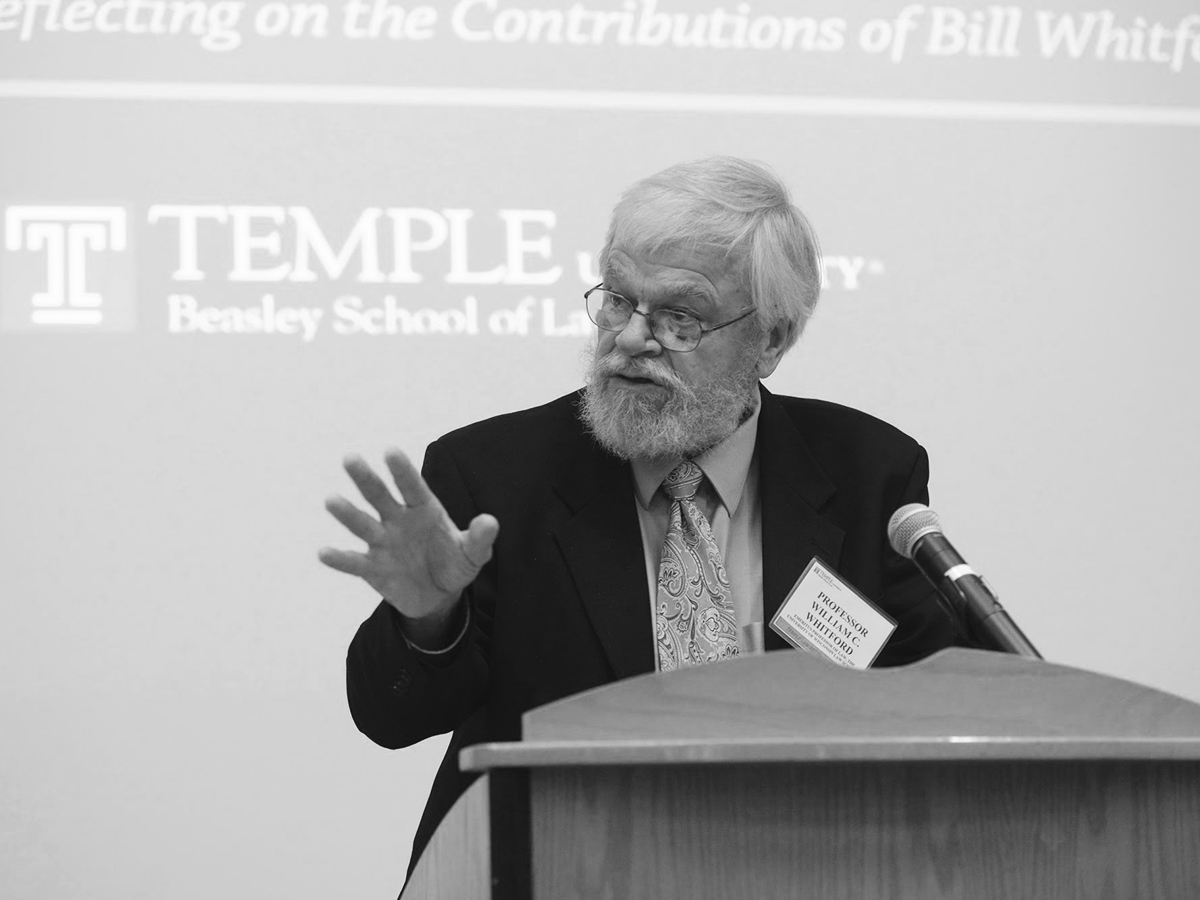Integrity and inclusion. These were the themes of a special Temple Law Review Symposium held Friday, October 24, 2014 at the Law School in honor of University of Wisconsin emeritus professor Bill Whitford. I organized the Symposium, which was attended by nearly 150 lawyers, scholars, and law students.
If you read that carefully, you may wonder: why would Temple Law School honor the senior member of what is essentially a competitor law school? Why did so many people attend an event honoring an emeritus law professor from Wisconsin?
The answer turns on the integrity and inclusiveness of Whitford’s contribution to teaching and scholarship in his 50-year career, as well as the special joint venture forged by Temple and Wisconsin in order to bring the project to fruition.
Whitford is one of the nation’s leading writers and teachers on consumer and corporate bankruptcy, contracts, and “law and society” (an important school of legal scholarship). He was an early empiricist, producing studies of contracting practices that inspired generations of scholars to look at the “law in action.” The Bankruptcy Research Database he created with UCLA law professor Lynn LoPucki radically altered the nature of research in corporate failure and bankruptcy.
The Symposium was designed to be “not just a series of tributes to Bill,” I said in my introduction, “but instead an opportunity for leading scholars from around the world influenced by his work to reflect and build on his scores of articles, book chapters and books.”
Panelists included Douglas Baird (University of Chicago), Jean Braucher (University of Arizona, who organized the Symposium with me), Robert Hillman (Cornell), Robert Lawless (University of Illinois), Angie Littwin (University of Texas), Lynn LoPucki (UCLA), Melissa Jacoby (University of North Carolina), Stewart Macaulay (University of Wisconsin), Katie
Porter (UC-Irvine), Iain Ramsay (University of Kent-UK), David Skeel (University of Pennsylvania), and Jay Westbrook (University of Texas). In addition, Senator Elizabeth Warren (D-MA), formerly a professor of contracts and bankruptcy, recorded a 6-minute video about Whitford’s impact on her teaching and scholarship.
The Symposium covered three major aspects of Whitford’s work: (1) corporate
reorganization, in particular the work he and LoPucki did in developing the Bankruptcy Research Database, and the enormous body of scholarship that grew from that database; (2) consumer bankruptcy and protection, in particular efforts to identify meaningful system reforms that go beyond the courtroom; and (3) comparative law and methodologies, with an emphasis on Whitford’s role in creating the field of comparative consumer bankruptcy, a
subject of growing importance as household debt increasingly influences social welfare and economic growth.
The prestige of the panelists, and the depth and breadth of Whitford’s contribution, drew the attention of both national media (the event was covered by Reuters (subscription required) as well as the National Bankruptcy Archives, which will house video footage of the Symposium. The video is also available now on Temple’s website at http://www7.law.temple.edu/events/whitford-symposium.
Although these scholars covered a wide range of topics, many focused on Whitford’s commitment to integrity in the legal process, in scholarship, and in the classroom, where Whitford not only taught thousands of students over the years, but developed one of the earliest and most successful broad-based diversity programs in a law school – one that has been emulated by other schools, including Temple.
Whitford’s commitment to inclusion was recognized at the Symposium not only through his commitment to diversity, but in the very structure of the program itself. Joint ventures among law schools are rare. This one—among Temple, the University of Wisconsin and the University of Arizona—reflected the essence of Whitford’s ability to reach across many different types of scholars, in many different fields, all of whom share his basic commitments to principled scholarship, access to justice and opportunities for those often
ignored by the legal system.
